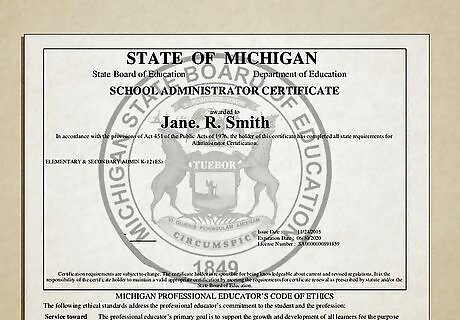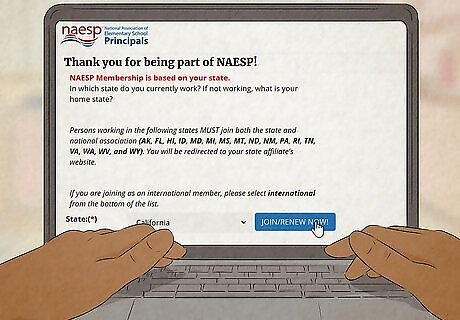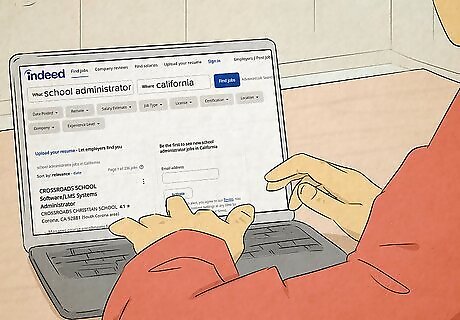
views
Are there different types of school administrators?

Yes, there are building- and district-level administrators. In public schools, the specific types of administrators vary depending on the size of the district and how the schools in that district are organized. Larger schools typically have more administrative positions. Here are some examples: Principals: oversee the daily operations of an individual school; larger schools may also have assistant principals Superintendents: oversee the daily operations of the school district as a whole; larger districts may also have assistant superintendents Athletic directors: oversee athletic programs of a district or school (typically only in larger high schools)
What do school administrators do?

School administrators manage school operations and coordinate the curriculum. On a daily basis, school administrators are responsible for general management and oversight functions, which can include everything from disciplining students to ordering building maintenance. Your job also might include any of the following responsibilities: Developing and coordinating school-wide or district-wide programs of instruction Evaluating teachers and other personnel Managing school or district fiscal services Recruiting and hiring teachers and other personnel Developing and managing student support services
What education do school administrators need?

Typically, school administrators have a master's degree in education. A bachelor's degree is typically all you need to become a teacher, but school administrators need a little bit more. If you're just starting your education career and think you want to move into administration at some point, it's a good idea to go ahead and get at least your master's degree before you start teaching. Master's degrees in education leadership or education administration teach you how to manage staff, create budgets, and work with the parents and community to set goals for your school. Many school administrators have a Ph.D. in education, especially those who aspire to state administrative positions. Depending on the role, you might be able to qualify as a school administrator with a master's degree in a different field. For example, an MBA might qualify you to work in human resources.
Do you have to teach before becoming an administrator?

Yes, most states require at least 2 years of classroom experience. The amount of experience you need varies among states, so check with your state's department of education to be sure. For example, Texas requires 2 years of classroom experience. However, California requires at least 5 years of full-time classroom experience. The grade level you teach can matter too. Even though it's not specifically required to be a school administrator in general, it helps if your experience matches the grades at the school where you're going to work. For example, if you want to be an elementary school principal, teach in elementary school. It can also help if you have experience teaching in several different grades instead of just one. For example, you might start in fourth grade, then switch to second grade, then switch to third grade. If you know you want to be an administrator when you first start in education, you might be tempted to start looking for an administrative position once you've finished the minimum 2 or 3 years of classroom experience required by your state. However, most administrators are in the classroom for 5-10 years before they transition.
Can you transition to administration after teaching for a while?

Yes, many school administrators switch later in their careers. If you work as a teacher for a while, you'll see both good administrators and bad administrators. You'll know the effect a bad administrator has on the school, the faculty, the staff, and the students. With that kind of experience under your belt, you have a better understanding of what it takes to be a successful administrator. Your experience can be especially beneficial if an administrator position opens up at a school where you've taught for years. You won't have to worry about establishing a good relationship with faculty and staff—they already know you and they'll be with you from day one. Keep in mind that being an administrator is more than just making the morning announcements and holding faculty meetings. You need to be there to solve problems among all the different groups affected by the education system—and you'll probably end up working even longer hours than you do as a teacher.
Is there a separate license for school administrators?

Yes, an administrator's license is required in public schools. To get a license, most states require you to take a preparatory educational program and take an exam. Check with your state's department of education to find out more about the specific requirements. For example, Ohio requires administrators to complete a state-approved preparation program and pass the licensing exam. The state charges a $200 fee to apply for the exam. California has a 2-tier licensing structure. You first apply for a preliminary credential, which is valid for 5 years. Your "clear" credential is issued once you've met all the requirements, including completing an education program and passing an exam. Private school administrators typically don't need a state license, but this varies depending on the school. If you're interested in working at a private school, check that school's specific requirements.
What other kinds of experience do strong candidates have?

Strong candidates are well connected and well informed about current issues. Boost your résumé with activities and events that show you're up-to-date and involved in the profession, as well as in local politics—particularly state and local education policies. Attend conferences and workshops, where you can connect and share ideas with other professionals. Demonstrate your leadership by giving presentations and putting yourself out there as an expert. For example, you might call your local news and let them know that you're available when they need a quote from an educator. Having your name in print bolsters your credibility and your reputation. Use social media to discuss educational issues and network with other professionals to help get your name out there. You might also consider writing a blog or doing guest blogs for an existing educational website.
Is networking important to become a school administrator?

Yes, being a school administrator is a highly public position. As with many career paths, advancement in education is as much about who you know as what you know. Having connections in your community and a reputation as a leader will greatly improve your chances of becoming a school administrator. Administrators are often promoted from within as well, so keep your eyes open for possible changes at the administrative level while you're teaching. Let the administration at your school (and your district) know that you're interested in an administrative position. You might just end up being at the right place at the right time! School administrators are expected to work well with the community, local government, parents, teachers, and staff to solve issues big and small. Networking with different groups and different types of people will help you perform your job better.
Do you need to join a professional association?

No, it usually isn't required, but it can be beneficial. Professional associations help you build a professional network as well as offering tons of resources to members that you can use to further your career and learn about hot topics in education. Here are some associations you might consider: American Association of School Administrators (administrators and superintendents) National Association of Secondary School Principals (high school principals) National Association of Elementary School Principals (elementary and middle school principals) National Education Association (all educators, including school administrators)
How do you find a position as a school administrator?

Search online for open positions and talk to other educators. As a teacher, you'll often hear "through the grapevine" when a position is coming open, whether at your school or another in the district. Openings are usually posted online through the school district's website. You can also find nationwide openings posted on general job listings sites online. Be careful with listings in other states, though—you'll need to get certification in that state, and the eligibility requirements might be different. Professional associations often post listings as well. For example, you can browse listings on the website for the National Association of Elementary School Principals (NAESP).
How do you apply to an open administrative position?

Submit a portfolio that describes your professional development. Your portfolio is like an expanded résumé that details your experience, accomplishments, professional activities, guiding educational philosophy, and goals as an administrator. In addition to the usual résumé, you might include programs from speaking engagements, papers you've written for educational journals, newspaper clippings, and letters of recommendation. Use your state's guidelines for tips on how to organize your portfolio. These are the areas that the hiring administrators will look for in making their decision. Professional associations also have resources that can help you build your portfolio. During the hiring process, you'll typically also present your portfolio to a board of administrators who will make the final hiring decision.
How much do school administrators make?

The median pay for principals is $98,490 a year, as of 2020. That figure includes elementary, middle, and high school principals. Higher-level school administrators tend to make more. Pay also depends on your state budget, the size of the district, and the size of the school. For public schools, principal pay is typically set by the state's education budget. This doesn't mean your pay will go down, but it might mean you don't get regular raises like you would in other fields. Pay varies considerably among private schools, but is usually lower than public school pay.



















Comments
0 comment